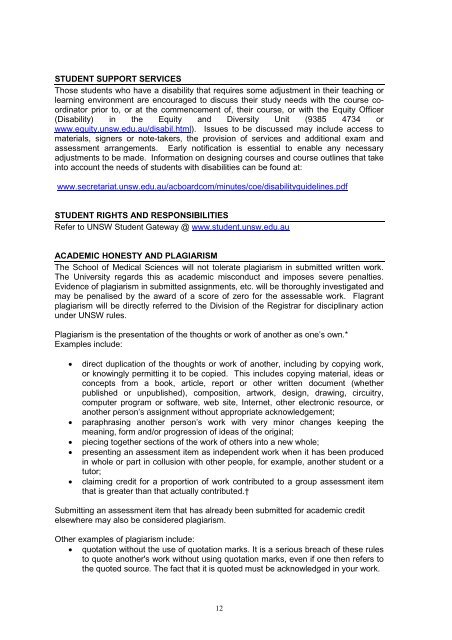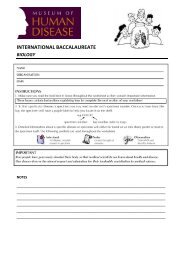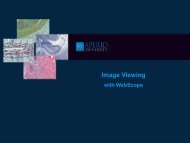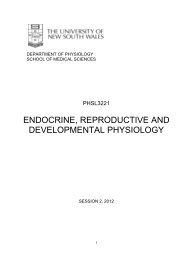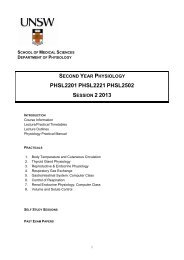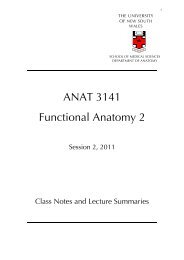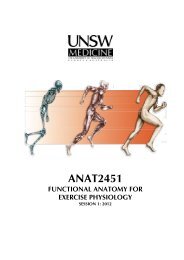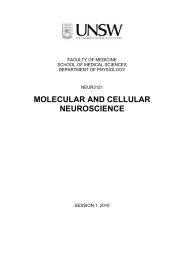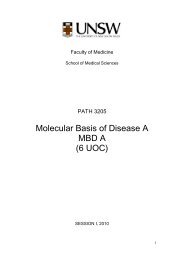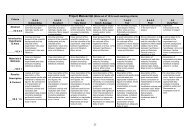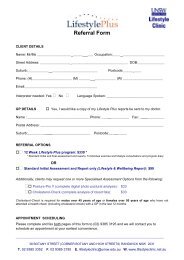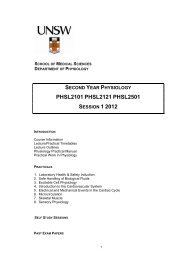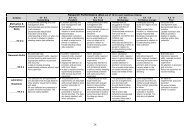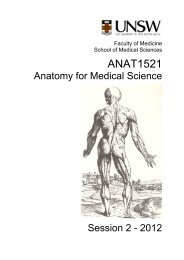PHSL2201 PHSL2221 PHSL2502 - School of Medical Sciences
PHSL2201 PHSL2221 PHSL2502 - School of Medical Sciences
PHSL2201 PHSL2221 PHSL2502 - School of Medical Sciences
Create successful ePaper yourself
Turn your PDF publications into a flip-book with our unique Google optimized e-Paper software.
STUDENT SUPPORT SERVICES<br />
Those students who have a disability that requires some adjustment in their teaching or<br />
learning environment are encouraged to discuss their study needs with the course coordinator<br />
prior to, or at the commencement <strong>of</strong>, their course, or with the Equity Officer<br />
(Disability) in the Equity and Diversity Unit (9385 4734 or<br />
www.equity.unsw.edu.au/disabil.html). Issues to be discussed may include access to<br />
materials, signers or note-takers, the provision <strong>of</strong> services and additional exam and<br />
assessment arrangements. Early notification is essential to enable any necessary<br />
adjustments to be made. Information on designing courses and course outlines that take<br />
into account the needs <strong>of</strong> students with disabilities can be found at:<br />
www.secretariat.unsw.edu.au/acboardcom/minutes/coe/disabilityguidelines.pdf<br />
STUDENT RIGHTS AND RESPONSIBILITIES<br />
Refer to UNSW Student Gateway @ www.student.unsw.edu.au<br />
ACADEMIC HONESTY AND PLAGIARISM<br />
The <strong>School</strong> <strong>of</strong> <strong>Medical</strong> <strong>Sciences</strong> will not tolerate plagiarism in submitted written work.<br />
The University regards this as academic misconduct and imposes severe penalties.<br />
Evidence <strong>of</strong> plagiarism in submitted assignments, etc. will be thoroughly investigated and<br />
may be penalised by the award <strong>of</strong> a score <strong>of</strong> zero for the assessable work. Flagrant<br />
plagiarism will be directly referred to the Division <strong>of</strong> the Registrar for disciplinary action<br />
under UNSW rules.<br />
Plagiarism is the presentation <strong>of</strong> the thoughts or work <strong>of</strong> another as one’s own.*<br />
Examples include:<br />
• direct duplication <strong>of</strong> the thoughts or work <strong>of</strong> another, including by copying work,<br />
or knowingly permitting it to be copied. This includes copying material, ideas or<br />
concepts from a book, article, report or other written document (whether<br />
published or unpublished), composition, artwork, design, drawing, circuitry,<br />
computer program or s<strong>of</strong>tware, web site, Internet, other electronic resource, or<br />
another person’s assignment without appropriate acknowledgement;<br />
• paraphrasing another person’s work with very minor changes keeping the<br />
meaning, form and/or progression <strong>of</strong> ideas <strong>of</strong> the original;<br />
• piecing together sections <strong>of</strong> the work <strong>of</strong> others into a new whole;<br />
• presenting an assessment item as independent work when it has been produced<br />
in whole or part in collusion with other people, for example, another student or a<br />
tutor;<br />
• claiming credit for a proportion <strong>of</strong> work contributed to a group assessment item<br />
that is greater than that actually contributed.†<br />
Submitting an assessment item that has already been submitted for academic credit<br />
elsewhere may also be considered plagiarism.<br />
Other examples <strong>of</strong> plagiarism include:<br />
• quotation without the use <strong>of</strong> quotation marks. It is a serious breach <strong>of</strong> these rules<br />
to quote another's work without using quotation marks, even if one then refers to<br />
the quoted source. The fact that it is quoted must be acknowledged in your work.<br />
12


